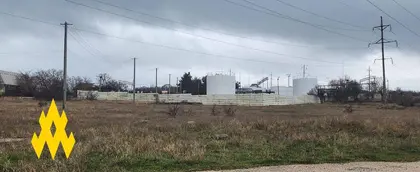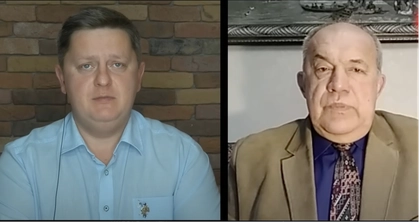The Atesh partisan movement reported on Telegram that its agents have been conducting massive reconnaissance operations to locate oil depots in Sevastopol and Kerch, situated in Russian-occupied Crimea.
The partisans released photos and videos of Russian oil depots.
JOIN US ON TELEGRAM
Follow our coverage of the war on the @Kyivpost_official.
The Atesh disclosed that in Sevastopol, most objects are fenced on all sides with concrete barriers topped with barbed spikes, and numerous closed-circuit television cameras (CCTV) - both visible and hidden - are installed. Observation towers for permanent guards and searchlights are visible at the facilities.
“Patrols circulate the territory every 25 minutes and, when transporting military cargo, accompany vehicles within the area,” the statement said.
According to Atesh, from December to March, agents of the movement collected information about oil depots in Kerch, which the Russians use for military purposes.
“Militarized guards are stationed at the facilities, and video surveillance cameras are installed... Some facilities are guarded by air defense systems,” the partisans reported.
The Atesh disclosed that fuel tankers regularly enter oil depots, indicating their active use.
“The information gathered was transferred to the Ukrainian Defense Forces for further action. We will assist them in delivering a crushing blow to the occupation military logistics!” the partisans said.
Ukrainian military intelligence announced on April 18 that Kyiv “destroyed or critically damaged” four launchers of Russia’s most powerful air defense system – the S-400 – in its early Wednesday morning attack on Russia’s Dzhankoi military airfield in occupied Crimea.

Holiday Spirit Thrives Among Ukrainians Despite War, Study Finds
Ukrainian partisans from the ATESН movement confirmed their involvement in the attack later in the day on Wednesday.
Back in March, following Ukraine’s attack on occupied Sevastopol that may have targeted the Black Sea Fleet communications center, locals reported a fire at an oil depot in occupied Simferopol.
In late March, the Financial Times reported, citing three sources, that the US had reportedly asked Kyiv to stop targeting Russian oil refineries out of fear of rising crude prices and retaliatory actions.
Sources quoted in the FT report also alleged that the Biden administration feared domestic unrest resulting from rising oil prices that could impact current US President Joe Biden’s chances of being re-elected.
In April, US Defense Secretary Lloyd Austin said Ukraine’s recent drone strikes on Russian oil refineries could have a “knock-on effect” that might impact the global energy situation, suggesting Kyiv focus on “tactical and operational targets” instead.
Republican Senator Tom Cotton rebuffed Austin’s comments, alleging they were made for political reasons and discouraged effective Ukrainian actions, stating, "It sounds to me like the Biden administration doesn’t want gas prices to go up in an election year.”
Since January, Ukraine has begun targeting dozens of Russian oil refineries deep behind the front line with domestically produced drones in an attempt to curb the revenues generated by oil sales Moscow has been using to finance its war in Ukraine, all amidst the ongoing munition shortage suffered on the front, partly caused by the stalled US military aid.
You can also highlight the text and press Ctrl + Enter






